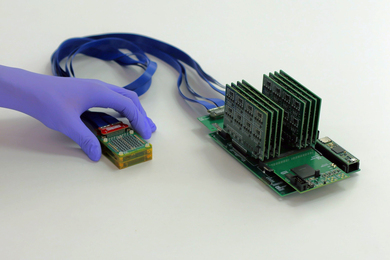President Susan Hockfield led an MIT delegation on a historic trip to India Nov. 16-24, meeting with key government and business leaders and strengthening ties between the Institute and the world's largest democracy.
MIT and India have a long history of shared ventures. The first Indian student entered MIT just 15 years after the Institute opened its doors at the end of the U.S. Civil War. Today, more than 33 MIT faculty members collaborate with colleagues in India, and 229 students from India are enrolled at MIT.
In a talk, "Universities and the Global Knowledge Economy," delivered at a meeting of the Confederation of Indian Industries in Mumbai and attended by about 125 business leaders, Hockfield said she sees the partnership between MIT and India as a natural one.
"MIT and India have a great deal to build on, starting with a century of friendship. I believe the strength of that friendship springs from some important cultural parallels between India and MIT: We both place a premium on analytical thinking. We both prize academic excellence. And we both celebrate the kind of positive, entrepreneurial spirit that makes new ideas come alive," Hockfield said.
Hockfield, the first MIT president to visit India while in office, met with Prime Minister Manmohan Singh during her trip. She also met with business leaders, including steel industry magnate Sir Ratan Tata, Infosys Non-Executive Chairman and Chief Mentor N.R. Narayana Murthy, Chairman of Reliance Industries Mukesh Ambani, and Biocon Chair and CEO Kiran Mazumdar-Shaw.
The delegation hosted a symposium in New Delhi titled "India and MIT: A Conversation About the Future," attended by 150 alumni and leaders from industry, academia and the media. The symposium was webcast; see links at right.
"The visit provided an excellent opportunity for the MIT delegation to highlight many of the ongoing interactions between MIT and India, and to explore new avenues for future engagement. It also created an opportunity for leaders in academia, industry and government in India to initiate a dialogue with MIT that could potentially lead to expanded interactions between MIT and India," said Subra Suresh, dean of engineering, who accompanied Hockfield during this trip. Suresh received his undergraduate degree in 1977 from the Indian Institute of Technology Madras.
MIT unveiled two new initiatives during the weeklong trip: I3 (International Innovation Initiative), which will fund emerging technologies, and a partnership with the new Translational Health Science and Technology Institute of India (THSTI), which will be modeled after the Harvard-MIT Division of Health Sciences and Technology (HST).
Funded by the Indian government, THSTI will be a multidisciplinary, multiprofessional research and training center with close ties to HST. HST will help recruit and train new faculty members for THSTI, and research and educational collaborations are being planned between the two schools, said director of HST Martha Gray, who was part of the MIT delegation.
"In the past few years, the attention of MIT's faculty and students has been increasingly turning towards having a global impact, and you can't have a global impact if you don't have global partners," Gray said.
Similarly, I3 will enhance MIT's innovation efforts around the world through partnerships with institutions in India and other countries.
I3 will be modeled on MIT's Deshpande Center for Technological Innovation, which funds innovative research and helps guide new technologies to the market.
"I3 provides a streamlined organizational umbrella to strengthen the innovation ecosystem at MIT by applying the best practices of the Deshpande Center to our international activities," said Suresh. He also announced the appointment of Charles Cooney, faculty director of the Deshpande Center and Robert T. Haslam (1911) Professor of Chemical Engineering as the faculty director of I3.
"I3 will allow us to apply what we have learned about converting early-stage science and technology into useful solutions to real-world problems," added Cooney.
Cooney, who sits on the board of directors of Indian biotechnology firm Biocon and has visited India at least once a year for the past 15 years, said he learns new things every time he visits.
Last month's trip offered the MIT delegation "a chance to see what it's like to operate in India, from the difficulties of moving around in heavy traffic, to the absolutely staggering opportunities in companies like Infosys and Biocon, where they have amazing facilities," Cooney said.
Alumni Vinay Rai '70, Adi Godrej '63 and Vikram Kirloskar '81 hosted receptions and dinners for the delegation and area alumni in New Delhi, Mumbai and Bangalore, respectively.
In addition to Suresh, Gray and Cooney, the delegation included Esther Duflo, the Abdul Latif Jameel Professor of Poverty Alleviation and Development; Arvind, the Johnson Professor of Computer Science and Engineering; Steven Lerman, dean for graduate students; Ram Sasisekharan, professor of biological engineering and health sciences and technology; Philip Khoury, associate provost; O'Neil Outar, director of institutional initiatives; Tuli Banerjee, director of the MIT-India Program; and Desh Deshpande, founding donor of MIT's Deshpande Center for Technological Innovation.
A version of this article appeared in MIT Tech Talk on December 5, 2007 (download PDF).






